|
|
|
Sort Order |
|
|
|
Items / Page
|
|
|
|
|
|
|
| Srl | Item |
| 1 |
ID:
132417
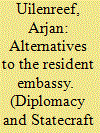

|
|
|
|
|
| Publication |
2014.
|
| Summary/Abstract |
Increasingly integrated in a common political entity, the European Union's member states are exploring new avenues to shape and maintain their mutual relations. This analysis describes three alternatives to the traditional resident embassy by which ministries of foreign affairs within the EU attempt to maintain diplomatic networks. The models discussed are secondments within member states' capitals, visiting ambassadors, and co-location and co-operation. In other words, with regard to different modes of representation, member states can consider diving in, stepping back, or pooling and sharing. These developments shed light on the ways in which the diplomatic machineries of the member states are trying to adapt to the demands of a "post-Westphalian" environment such as that of the EU.
|
|
|
|
|
|
|
|
|
|
|
|
|
|
|
|
| 2 |
ID:
132412
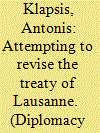

|
|
|
|
|
| Publication |
2014.
|
| Summary/Abstract |
In June 1925, General Theodoros Pangalos imposed his dictatorship on Greece. During his 14-month rule, he set as one of his basic foreign policy goals the revision of the territorial settlement imposed on Greece and Turkey by the 1923 Treaty of Lausanne. Wanting to secure Eastern Thrace and possibly even part of Western Asia Minor for Greece, Pangalos sought the backing of at least one Great Power with interests in the region, in this case Italy, as its dictator, Benito Mussolini, remained equally hostile and aggressive toward Turkey. Pangalos tried to reach an understanding with Mussolini concerning the possibility of joint Greco-Italian action against Turkey. The first signs of closer co-operation came in early July 1925 when the Italian under-secretary of foreign affairs, Dino Grandi, visited Athens for discussions with Pangalos. However, a more important initiative involved the official visit of two Greek ministers-Loukas Kanakaris-Roufos, the foreign minister, and Anastasios Tavoularis, the transport minister-to Rome in early March 1926. They met with Mussolini who, because of British pressure, now seemed reluctant about Pangalos' ambitious plans for joint action against Turkey. The Greek leader's hopes to revise Lausanne ended.
|
|
|
|
|
|
|
|
|
|
|
|
|
|
|
|
| 3 |
ID:
132411
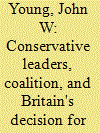

|
|
|
|
|
| Publication |
2014.
|
| Summary/Abstract |
Conservative leaders may have had a decisive impact on the decision by the Liberal government to enter the Great War in August 1914. In a seminal article of 1975, Keith Wilson argued that their readiness to fight "cut the ground … from beneath the feet of the non-interventionists" in the Cabinet. Those ministers who had hitherto opposed war now recognised that continued divisions could bring the government's collapse, in which case the Unionists, probably in a coalition with pro-war Liberals, would take office and enter the conflict anyway. Since Wilson's essay, important light has focussed on Unionist thinking by works that look at the July Crisis as part of a longer party history. This analysis provides a detailed investigation of the actions of Unionist leaders in the days immediately leading to war. It resolves some of the main contradictions in the primary evidence, argues that the possibility of a coalition was very real and demonstrates that one key player-the first lord of the Admiralty, Winston Churchill-subsequently tried, with some success, to disguise his activities.
|
|
|
|
|
|
|
|
|
|
|
|
|
|
|
|
| 4 |
ID:
132413
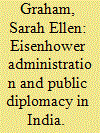

|
|
|
|
|
| Publication |
2014.
|
| Summary/Abstract |
The United States-India relationship was fraught with misapprehension and ideological disagreement during the 1950s. Public diplomacy provides a valuable context for examining these dynamics. This analysis assesses the planning, deployment, and reception of American public diplomacy to India under President Dwight Eisenhower, a period encompassing Washington's 1954 alliance with Pakistan and economic aid to India in 1957-1958. Public diplomacy reflects the Administration's difficulty in clarifying its interests in India. The rhetorical and moralising approach of India's leadership, and their prominence in the global non-aligned movement, contributed greatly to this ambivalence. Public diplomacy planning highlights Washington's difficulties in confronting India's identity in world politics; it struggled to craft messages on racial attitudes, consumerism, and Communism, whilst Soviet public diplomacy gave strong competition throughout the period. At the same time, several aspects of American public diplomacy resonated with Indian audiences, indicating that there was the possibility of a closer American relationship with India had Washington taken a different high policy approach to the region.
|
|
|
|
|
|
|
|
|
|
|
|
|
|
|
|
| 5 |
ID:
132414
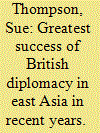

|
|
|
|
|
| Publication |
2014.
|
| Summary/Abstract |
Arthur de la Mare, an under-secretary of state at the British Foreign Office, wrote in 1967 that the ending of the Malaysia-Indonesia Confrontation of 1963-1966 was "the greatest success of British diplomacy in East Asia in recent years." However, historians generally believe British influence in the process to end this conflict was extremely limited, as it has been widely accepted that this conflict ended through bilateral negotiations between Jakarta and Kuala Lumpur. On one level, this view is accurate, but "Confrontation" took months to end and, during this process, British, American, and Malaysian officials hoped to encourage a change in leadership in Jakarta and an eventual end to the conflict. Confrontation was an anti-colonial and a regional dispute greatly affected by the Cold War environment in Southeast Asia and, therefore, not immune from international events or actors, especially the final phase of the conflict
|
|
|
|
|
|
|
|
|
|
|
|
|
|
|
|
| 6 |
ID:
132416
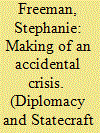

|
|
|
|
|
| Publication |
2014.
|
| Summary/Abstract |
This analysis re-examines the Carter Administration's formulation of policy on the theatre nuclear force issue following the neutron bomb affair. It demonstrates that European leaders did not foist the arms control component of the NATO dual-track decision on Jimmy Carter. Rather, the Carter Administration understood the merits of an arms control component following the August 1978 PRM-38 review and thought that Soviet-American arms control negotiations would play a crucial role in resolving the conflict between NATO and the Warsaw Pact over theatre nuclear forces. This analysis also considers the previously unexamined interactions between the United States and the Soviet Union in the months leading to the dual-track decision. It reveals that American officials underestimated the degree of Soviet anger over the dual-track decision, believing that arms control negotiations with the Soviets on theatre nuclear forces would be possible and productive. The Carter Administration did not foresee the Euromissiles crisis.
|
|
|
|
|
|
|
|
|
|
|
|
|
|
|
|
| 7 |
ID:
132410
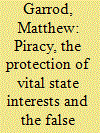

|
|
|
|
|
| Publication |
2014.
|
| Summary/Abstract |
It is widely asserted by courts and in legal scholarship that for hundreds of years universal jurisdiction has applied to the crime of piracy. However, the alleged historical legal foundations of universality need challenge. The central argument of this analysis is that jurisdiction over "piracy" is better understood under the protective principle, which arose out of the necessity of maritime Powers roughly between the seventeenth and eighteenth centuries to protect certain of their vital interests, not least their overseas trade routes and colonial trade and settlements. It follows that there is a need to re-conceptualise jurisdiction over piracy as the protection of vital State interests shared by the international community, a concept misinterpreted as universal jurisdiction.
|
|
|
|
|
|
|
|
|
|
|
|
|
|
|
|
| 8 |
ID:
132415
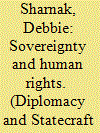

|
|
|
|
|
| Publication |
2014.
|
| Summary/Abstract |
This analysis examines the evolution of Jimmy Carter's human rights policy towards the Third World during the course of his Administration. By exploring the impact of the Soviet invasion of Afghanistan and the Soviet-backed Vietnamese invasion of Cambodia, it analyses how Carter responded to international outcry by pairing sovereignty as a human right, which specifically appealed to the concerns of newly independent nations in the late 1970s. Carter's shift is explained first by a brief outline of his initial human rights policy and stumbling blocks; second, by examining Third World responses to the dual invasions; and, finally, exploring how this affected Carter's human rights policy. It moves beyond claims that Carter abandoned his human rights agenda as he encountered an increasingly volatile international environment, instead examining the very real ways that he re-imagined this policy in the face of a changing global landscape.
|
|
|
|
|
|
|
|
|
|
|
|
|
|
|
|
|
|
|
|
|